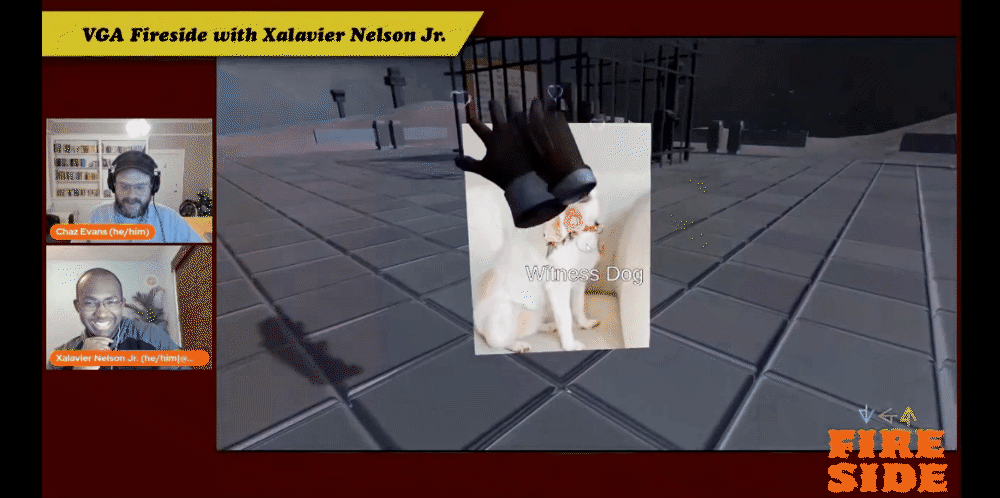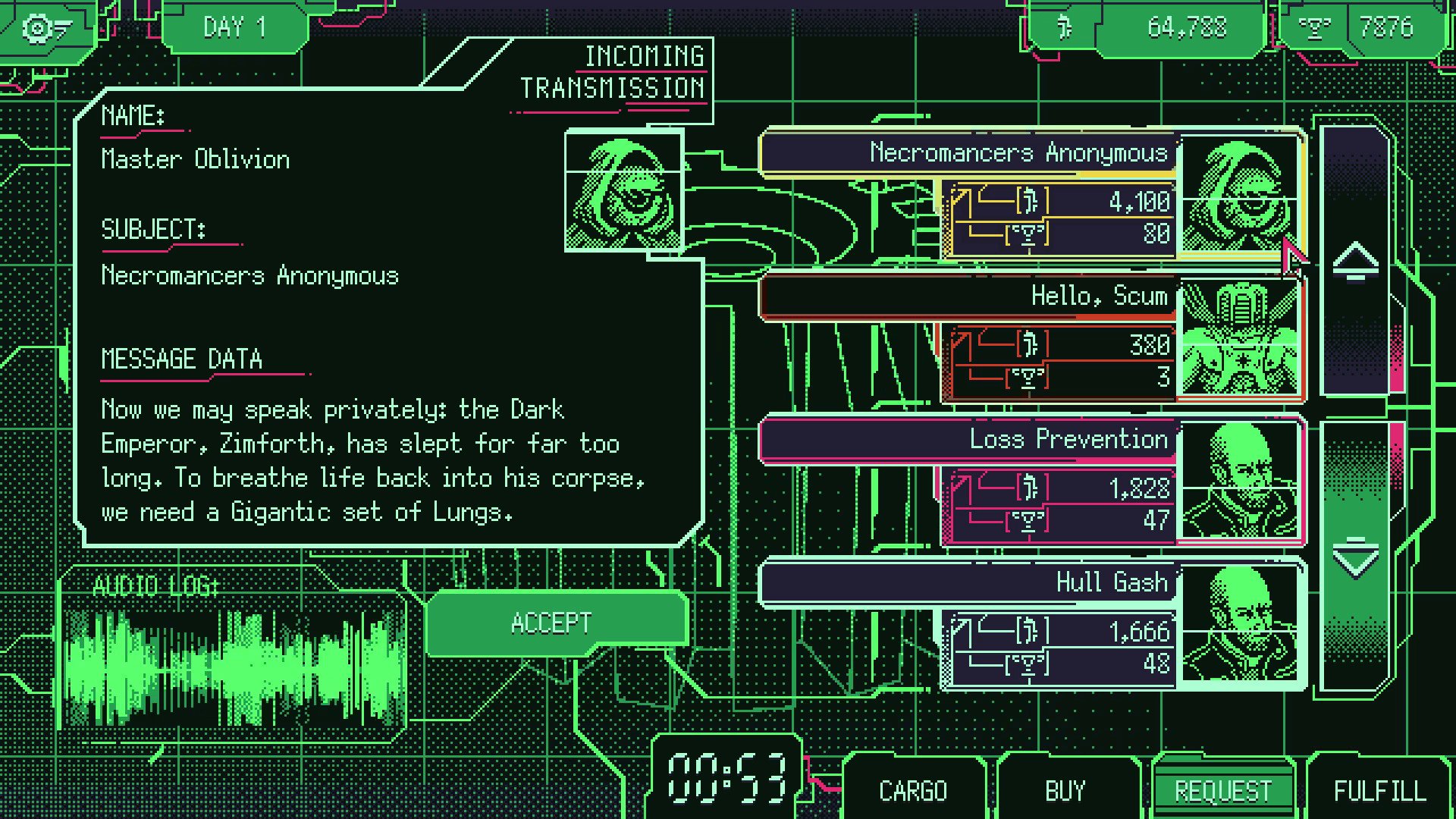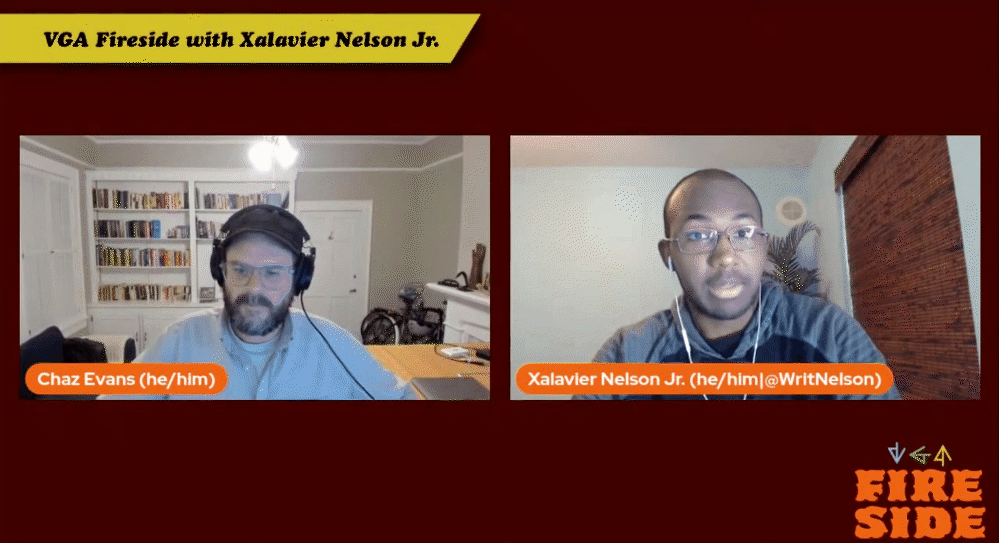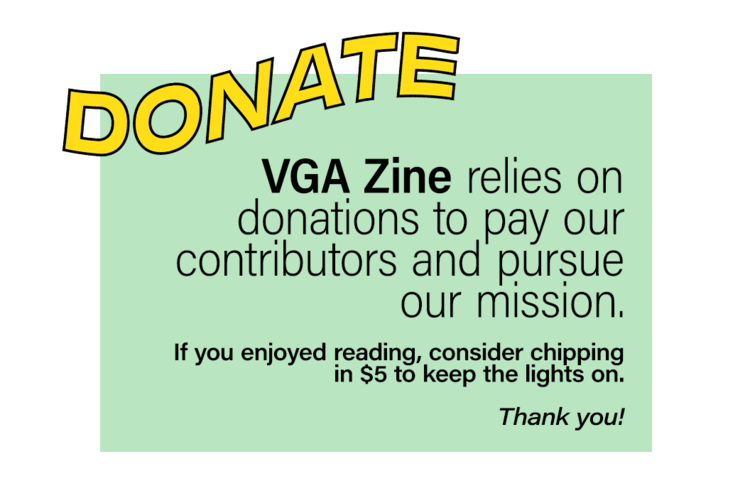VGA Fireside Ep. 10 feat. Xalavier Nelson: Interview Highlights
For this year’s final episode of VGA Fireside, we had the chance to sit down with Xalavier Nelson Jr.
Nelson is a BAFTA-nominated, award-winning narrative director, writer, ex-PC Gamer columnist, IntroComp organizer, and MCV Rising Star. He is best known for his work on games such as Reigns: Beyond, Hypnospace Outlaw, Can Androids Pray, SkateBIRD, and An Airport for Aliens Currently Run by Dogs.
Below are some of the highlights from Chaz Evans’ conversation with Xalavier, edited for clarity and brevity. The full interview can be found on VGA Gallery’s YouTube and Twitch channels, where you can see gameplay from An Airport for Aliens Currently Run by Dogs and hear about their most recent project, Space Warlord Organ Trading Simulator.
How Xalavier began his video game making journey…
Chaz Evans: So let me just start things off by asking you simply, how did you get involved with video game making?
Xalavier Nelson Jr.: At the age of 12, I pretended to be an adult so I could become a games journalist and somehow it worked.
CE: That's terrific. Do you want to expand on what strategies a 12-year-old likes to use to pretend to be an adult? Just the anonymity of the internet, perhaps?
XN: Anonymity of the internet, and persistence.
CE: Mhmm. So at 12, you're already joining the industry so to speak. Was there any part of your experience in education that directly touched on games? Or were you cutting your own path the whole time?
XN: The interesting thing is, because I was homeschooled, and my parents were particularly fond of a philosophy known as “unschooling,” which is that your human experience is a greater teacher than staring at a textbook for eight hours a day, they were very open to alternative ways of fulfilling assignments and reaching educational goals. So if I was really interested in spies, my mom would take me to the library, I pick up like all sorts of books about spies from all different age ranges, fiction, nonfiction, I gobble that up. And that fulfilled everything from history to social studies to et cetera. It's an open and more so unplanned way of pursuing a wider educational goal. Up until that age, I hated writing. I never wrote an essay. Despised it. But suddenly, I found out that games journalists get games for free and I was like, I'm 12 years old. This is a perfect job, games for free?! Rent doesn't exist! There's nothing else a human being needs!
CE: What else would you use money for other than video games?!
XN: Just inject chicken tenders into my neck and I get free games! So uh, yeah, in terms of my educational course, my education became business, communication, figuring out how to try to be a professional anonymously by the internet.
CE: Did your precocious age ever, like, become revealed and cause any problems in that professional setting?
XN: Not really. I'm sure there's some people who suspected. But also for good or ill, whatever this says about our industry or the internet or whatever else, a lot of the stuff I did didn't appear much different than any other amateur journalistic endeavors. It was just precocious and persistent, right? And I did my darnedest and I made a lot of mistakes. And I learned a lot of cool things too, and hopefully found ways to, even at that precocious age and state, find ways to make a positive impact on other people.
On his shift from games journalism to narrative design within video games
XN: The first is a matter of perspective. I'm very, very thankful to God that one of the early things that was determined in my heart was, I don't want to just get my foot in the door of the industry. I want to find what will keep me here. What do I actually care about in terms of the process of bringing things to life?
So every career move, and pivot and subtle shift I made was following what sparked joy the most often, and allowed me to have a positive impact, not just on my own career, but on the capacity and working environment of my collaborators.
Second is practicality, which is after I got past the honeymoon period of “I'm 12 years old and getting free games, yay!” (Very muppet-like). A series of truths and realities, including rent, paying bills, feeding yourself, becoming a parent and coming from a very lower middle class background… I had a deep desire to never risk or invalidate the sacrifices that had been made to try to put me in a position to pursue my dreams. So everything I was doing in terms of thinking about my next career move was in the context of, What are the tools I have available? What is at hand within my reach that doesn't put me in a position of debt or other extenuating circumstances that might risk not just my creative career, but also you know, my livelihood or that of the people that I love? So I started getting from journalism to games by making games with what I had. The one thing I could wrap my head around at the time was Twine. Because I knew a little bit of HTML, and I could write. So I did whatever interesting thing I could with that limitation. And as my capacity to do things has increased, it's always been a question of, not what could I do, future tense speculative, but what can I do right now that's interesting within the resources and limitations I even proactively define.
On the games and their aspects that influenced their work as a journalist and current narrative design work
XN: I'd say one of the really, really big influences that arrived was a title called the Neo Scavenger. I've since had the opportunity to work with Daniel Fedor, on Ostranauts, which is his next game, which I'm very, very grateful for. But at the time, I played it as a teenager, and with a set of deterministic systems and a very particular framing it created. And the emotional impact on me as a player that utterly outweighed the extensible, even like, quote, unquote, work that went into those systems, right? Like I'm moving little icons into other boxes to select actions. And somehow, because of the framing of that work, and the structure of it, those little icons become an entire world. They mean everything.
I've had a lot of really impactful games come along, including also Dropsy by Jay Tholen, who have also had the opportunity to work with since on things like admin space outlaw. But I think a lot of Neo Scavenger in terms of how context elevates a work. You can have the best game mechanic in the world, but without a context to make that mechanic into something more than the sum of its parts…
Another great example is a game called Cargo Commander. Cargo Commander is ostensibly a 2d 2.5D action rogue-like about going through procedurally generated mining halls and gathering resources and getting the heck out before you're eaten, and before your oxygen runs out. But after you do your first few missions, you get a letter. It's from your family back on Earth, and it turns out they're in a cycle of debts which you contracted yourself out to this company to try to get them out of. And a couple more letters arrive and you realize your money isn't making it home. And it looks like they're going to lose the house. And suddenly, you weren't just playing those missions to, you know, get the next upgrade. It's like, I need to get back to my family! What's happening? Then you can't contact an administrator. Every time you wake up, there's this lonely bluegrass song playing.
It’s an enjoyable but fairly standard 2.5D action loop. A pretty clever platformer, but still just like, at the end of the day, it's quote unquote, “Just a game,” right? And with a few lines of text and a couple of pictures, that thing is elevated into an emotional expression, a mode of intent, a creative vision. And yeah, whenever I look at—whenever I'm either working as a contractor on a project or developing a project now I think, What is the thing, what is the small touch of humanity, that makes this more than an interesting mechanic?
On dog currency in An Airport for Aliens Currently Run by Dogs
XN: In this game’s world, actually, an even earlier discussion was currency. How do you buy tickets? How do you buy items? What's the currency system? How do you earn it? And the consideration that we had was there's this kind of this mutual point of understanding where me and my principal collaborator in this game, Tom Vinita, we looked around and went like, There is no currency system. Dogs don't care about money. They just give things away if it's going to make you happy. If it's going to help your life be better, of course, a dog is just going to give it to you.
So yeah, you go to an ATM, press the button, it just gives you money. And most dogs don't care about money. So it doesn't necessarily do anything anyway, depending on the dog you're talking to. So following this chain of logic became a very cathartic and like rebuilding process for the soul of what does the universe look like when it is built on joy, when it fundamentally cares about you, regardless of any external factors. The same way that dogs approach, you know, human beings.
On the inspiration and Xalavier’s own experiences for An Airport for Aliens Currently Run by Dogs
XN: In terms of airports, I traveled a lot pre-pandemic. And one of the big breakthrough points of the project was when I realized that we had the story, which was: You are finding your partner again and again across the universe to spend time with them. As you both pursue your own independent lives as a long distance couple and professional human beings, you've entered the timezone…
One of the big moments I realized is I thought I was making a game about, you know, you pursuing a relationship across the stars. And I realized, oh, I'm Krista. Because I was constantly leaving my family to, you know, do my work. And I wanted them to know that even if I wasn't in the same place as them, that didn't reduce any of my affection or commitment for them. So yeah, I ended up in this very interesting position, where I realized I was creating a game about pursuing myself as this career oriented person who nonetheless had a deep emphasis on the people in their lives and wanted to help them understand why this happened.
It's also very much inspired by the fact that I can I come from a military brat background. Dad would be gone for months, up to a year. And he'd come back and none of the love went away for him. It's just simply separated by distance. Every single program I see talking about long distance relationships treats it as a death knell. Like this is the death of the relationship; it's all gonna fall apart now. I want to present a counter example to this. What does a healthy long distance relationship look like? Having seen it, and having hopefully you know attempted to cultivate it in my relationship with my own family, it's up to the players how that landed. But seemingly, for the people who played the game, it hit hard.
On the creative process behind their most recent game, Space Warlord Organ Trading Simulator
Space Warlord Organ Trading Simulator, Image courtesy of Steam
XN: One of the first major discussions we had was, is the soul an organ? Like I was like, it's gonna be a space world organ trading simulator. And then I had to identify what an organ was. And I realized in this descending chain of madness, everything from economics to like, what is an organ and what isn't an organ, even the function of an organ is, in many cases arbitrarily determined, the economy is us mutually deciding the economy exists. Elon Musk couldn't say “Tesla's pretty high, to be honest…” and have that stock crater if it was based off of real value. It's a reflection of emotional investment and mutual belief, right?
So when the question is asked, is a soul an organ? It's like, you know what? Screw it. Yeah. Okay. The soul is an organ. This is a game where you can literally buy and trade a human soul. Because when we put a dollar value on a thing, for some reason, our reptile brains change the context of it and anything is okay… Also pursuing this chain of implications from what it means to buy, sell, and trade organs, how does that impact society? What is the internal logic of this world from character names to beliefs to human nature and then fleshing it out in the most active and creatively enabling and healthy environment possible. That was the hope, that was the goal. And at least as far as the dev process goes, I really feel like we achieved that.





